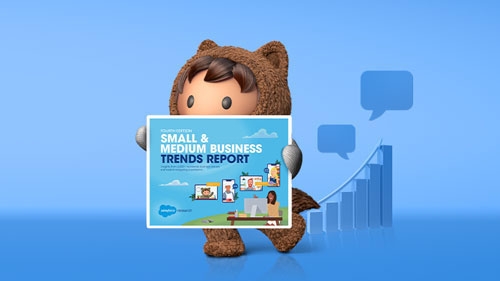An “About Us” page is your brand’s first digital impression with potential customers. However, many small and medium-sized business (SMB) owners don’t use it effectively to connect with their target audience.
Writing an informative and compelling “About Us” page might seem simple, but it’s surprisingly easy to underestimate its importance. You might wonder if people even read it, but research suggests they do. If you’re a small business owner, there are a few things to keep in mind when building out your own page, and we’ve created a quick list for you, right here.
What we’ll cover:
- What’s an “About Us” page and what’s included?
- Surprising stats about “About Us” pages
- Eight tips for writing your small business “About Us” page
- Write your small business “About Us” page with confidence
What is an “About Us” page and what’s included?
An “About Us” page is a dedicated section on your website that helps your visitors know who you are, what you do, and why you do it. It’s a great opportunity to establish trust and show the human side of your business. It’s not about what you sell but also what you stand for. And that’s why about 64% of people choose brands that share their values.
Your “About Us” page introduces you to your customers. You should include who you are, who your team is (if you have one), why you started the brand, your vision, mission, and how you plan to grow. You can be as personal (or not) as you’d like.
Surprising stats about “About Us” pages
The “About Us” page plays a significant role in connecting with your visitors, affecting how much they engage and spend. Here are some statistics about why this page matters:
- Customers who visit your “About Us” page spend 22.5% more than those who don’t.
- 52% of people say that when they land on a website, they want to see the “About Us” page first.
- 31% of people say that a website’s “About Us” page is its most important part.
- 44% of website visitors will leave if there’s no contact information.
- 63% of consumers prefer to buy from brands that have a purpose.
Start with SMB Basics
Eight tips for writing your small business “About Us” page
All set to create one? Here are eight tips and examples for writing a great “About Us” page for your small business that gets your message across — and turns browsers into buyers.
1. Put a face to the name
Create an instant connection by showing your customers the real faces behind your brand. When you add team photos with names, roles, and additional details or an introductory video, getting your customers to connect with the brand on a human level becomes easy.
Take Salesforce’s “Our Story” page, for example. By including our mascots, testimonials, culture, and team photos along with information on our business, we show people that we’re human and care for our customers.
2. Share your small business story
Another essential element of your “About Us” page should be your elevator pitch — a short, snappy version of your business’s story that explains:
- What you do
- What makes you unique
- And why people should care
It’s basically the same sales pitch you’ve been perfecting for your small business networking events. Remember that your pitch must be relevant to your potential customers. When sharing background information, like a company timeline, focus on details that are meaningful and relevant to your customers’ interests and needs. They might get disinterested if you rattle off a dry, chronological history of your business. Creating a timeline keeps it short, sweet, and visually appealing. How you design the page is almost as important as the key concepts you include. Your business history should include:
- When and why your business was founded
- What problem you’re helping to solve
- How you’re contributing to improving your industry
- Your business goals
- Customer experiences through testimonials and reviews
3. Tell people what’s in it for them
A crucial element of good marketing copy on an “About Us” page is that it’s benefit-led. Always remember to speak about what matters to the customer rather than yourself.
See each page of your online presence as a chance to tell potential customers more about your product — and your “About Us” page is no different. Consider sharing the motivation behind your product or service. Explain how it solves real customer problems to show value without using a hard-sell approach.
For example, look at Slack’s “About Us” page, which clearly states that it makes its users’ work-life simpler, more pleasant, and more productive. Bringing people together has always been at the core of Slack, and the page reflects its values around productivity and collaboration.
Source: Slack
4. Show off your personality
The more personal you’re on your “About Us” page, the more connected your potential customers will feel. A business that reflects the personality of its founders and employees can be highly attractive to customers. Your customers should know you value them beyond a transaction and are willing to build a connection. 6 in 10 consumers feel that companies treat them as a number rather than an individual. So, bringing your personality and authentic self to the table matters.
Let’s look at MillerKnoll’s “About Us” page, where they say, “We’ve never been afraid to do things differently. That’s why we’re taking on the biggest challenges facing our global community.” They understand the importance of writing a compelling story by talking about why they exist, their values, and the difference they’re making. Making their story personal is something that even large enterprises struggle with — giving your SMB’s “About Us” page a clear advantage.
Source: MillerKnoll
5. Build trust with social proof
Customer testimonials are powerful persuaders. Just think about how much you trust ratings and reviews when buying a new phone or looking for a restaurant. The experiences shared by others are an incredibly valuable marketing tool that you shouldn’t skip.
Did you know that about 85% of consumers trust online reviews as much as personal recommendations? For an SMB — where word-of-mouth recommendations generate new business — customer success stories can add value.
Just one or two quotes from your customers can create a positive impact. We recommend including the name, job title, and company name to build trust and relevancy in the quote. Even when you can’t quote their names, you can always mention their titles.
Snapology of Lehi, which offers STEAM-learning programs, showcases its testimonials in its About section. It’s a solid way of building trust as they feature 100s of testimonials from parents, helping other parents make a choice for their children.
Source: Snapology of Lehi
6. Keep it short and simple
The “About Us” information has a specific purpose: to provide sufficient reassurance to the reader to confidently take the next step toward becoming a customer. So it needs to have enough information to achieve that effect, but still be short enough so reading it won’t feel like a chore.
While it’s possible to get concise and leave out important information, you should also avoid getting into too much detail. Remember that although you’re interested in the details of what you do, your reader isn’t — at least not yet. Once you’ve delivered the elevator pitch and shown the reader what they can do, it’s time to stop writing.
Pro tip: A short video about the team or brand is a great way to engage and humanize your brand. Users are more likely to engage with a video than with text. About 86% of video marketers say that video content has helped them increase web traffic. You can embed videos on your website for testimonials, how-to videos, customer success stories, or to show brand values. Videos are great for capturing visitor attention, increasing time on site, and converting visitors into customers.
7. Turn browsers into buyers
While an “About Us” page isn’t usually a direct conversion tool, it should move readers one step closer to buying your product. Think of it as an opportunity to remove barriers in the customer’s mind by answering questions they might not even be aware of having.
One way to approach this is to add self-service, with a frequently asked questions (FAQs) section. Here are a few ideas to get you started:
- Who are you?
- What makes your brand different?
- What are your prices?
- Are there added fees?
- What are the product/service specifics?
If you’re a solo entrepreneur or small business with limited resources, consider using Agentforce, autonomous artificial intelligence (AI) agents. You can automate basic customer interactions or answer FAQs. And the best part? You can customize agents per your business needs and workload. From handling customer support and offering personalized recommendations to your visitors to running campaigns and engaging prospects — Agentforce can help you with customer attraction and retention.

8. Don’t forget your calls to action
When customers are comfortable with your pitch and ready to continue, don’t miss the opportunity to act. Keeping them moving through the sales funnel can be as simple as including two or three suitable calls to action (CTA). You’ve already invested effort in convincing them, so guide them toward the next step.
Many businesses treat their “About Us” page as purely informational, often overlooking an opportunity for engagement. Motivate your readers to engage with your brand by including a clear and direct CTA. Whether it’s a link to a product page or a prompt to subscribe to your newsletter, your “About Us”’ page is a great place to draw potential customers deeper into your website or collect their email addresses.
Check out how Mindbody’s “About Us” page brings consumers and businesses together. As the page offers CTAs for both booking and offering classes and job searches, it attracts diverse users.
Source: Mindbody
Did you know you can build a solid website, integrate CTAs, and turn browsers into customers using customer relationship management (CRM)? A CRM tool offers centralized customer information, allowing you to track everything from customer interactions and conversions to team productivity and sales processes.
You can quickly build an online store using our out-of-the-box storefront templates and deliver consistent experiences to your customers. A CRM for small business is a smart way of prioritizing growth and maximizing your website — every page counts.
Scale smarter, not harder
Hundreds of SMBs rely on Starter — the CRM that grows with your business.



Write your small business “About Us” page with confidence
Now that you have all the necessary tips and tricks for writing your “About Us” page, you might wonder — what’s next. The right tool can help you take your business to the next level. We built Starter Suite with your needs in mind. It’s a ready-to-use CRM that delivers powerful tools for marketing, sales, service, and commerce from day one.
Start your journey with a Starter Suite today. Looking for more customization? Explore Pro Suite. Already a Salesforce customer? Activate Foundations for free.
AI supported the writers and editors who created this article.
































